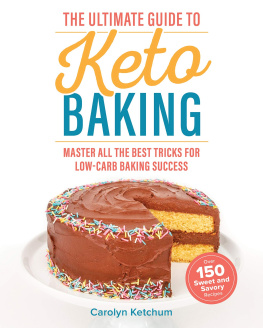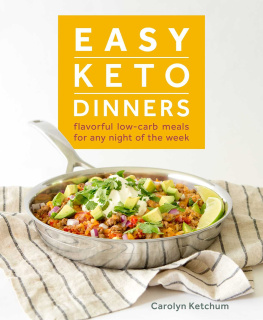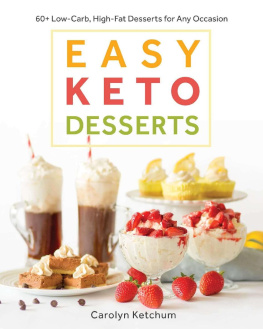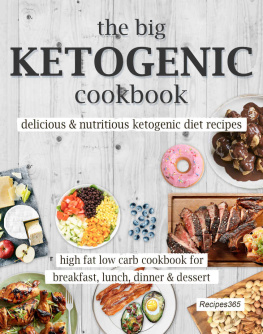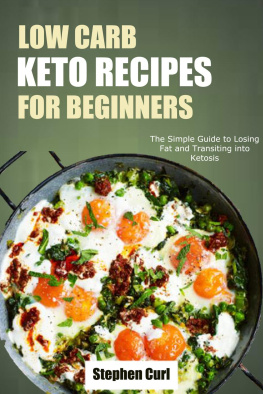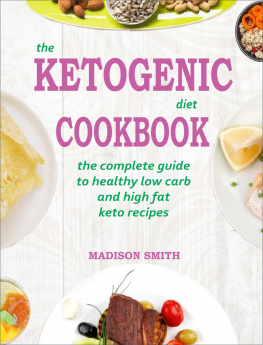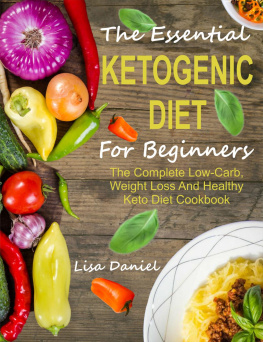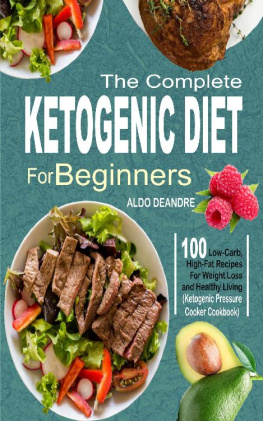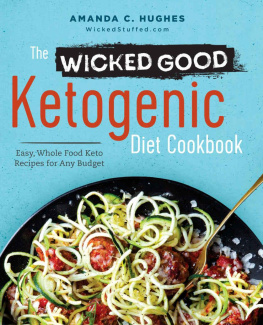First Published in 2017 by Victory Belt Publishing Inc.
Copyright 2017 Carolyn Ketchum
All rights reserved
No part of this publication may be reproduced or distributed in any form or by any means, electronic or mechanical, or stored in a database or retrieval system, without prior written permission from the publisher.
ISBN-13: 978-1-628602-62-3
The author is not a licensed practitioner, physician, or medical professional and offers no medical diagnoses, treatments, suggestions, or counseling. The information presented herein has not been evaluated by the U.S. Food and Drug Administration, and it is not intended to diagnose, treat, cure, or prevent any disease. Full medical clearance from a licensed physician should be obtained before beginning or modifying any diet, exercise, or lifestyle program, and physicians should be informed of all nutritional changes.
The author/owner claims no responsibility to any person or entity for any liability, loss, or damage caused or alleged to be caused directly or indirectly as a result of the use, application, or interpretation of the information presented herein.
Farmers market photos taken by Rebekah Hubbard
Author photo taken by House of Bonas
Front and back cover photos by Hayley Mason and Bill Staley
Interior design by Yordan Terziev and Boryana Yordanova
Printed in Canada
TC 0117
d_r0
TABLE OF CONTENTS

This book is dedicated to my dad, John R. Currie.
Any man can be a father; thats simply biology. But not every man can be a Dad.
Thank you for always being a Dad.

FOREWORD
When Carolyn Ketchum asked me to write the foreword for her book, I was excited to do so. It wasnt just because I have followed her excellent website for many years, and it wasnt just because we share the same publisher. It meant that she was writing a book, and I was going be among the first to see it.
Carolyn and I both became interested in a low-carb, high-fat ketogenic diet through our experience with diabetesher experiencing gestational diabetes while carrying her third child, and myself through my work over the last quarter century to wipe out type 2 diabetes (a form of accelerated aging!), starting with the first centers for metabolic medicine. We both have dedicated ourselves to the goal of promoting a low-carb, high-fat diet to mitigate many of the health problems our society is facing today.
In addition to our shared history, what made me want to provide the foreword for this book is the fact that Carolyns approach to a high-fat ketogenic diet is so complementary to my own. I endeavor to discover the truest and best science behind health and nutrition, but without delicious ways to implement that science, compliance can be difficult. This is where Carolyn shines. She is well known for her low-carb baking skills, making incredibly tasty treats that many of us thought were out of reach on a healthy diet. The only willpower necessary for The Everyday Ketogenic Kitchen is to refrain from trying the next great recipe immediately.
The recipes in this book are truly a treat, whether you strictly adhere to a high-fat keto lifestyle or you are just looking for new ideas for making healthy and satisfying meals. Carolyn covers all the bases, from sauces, snacks, and main courses featuring a variety of proteins to what she has become very well known for, everyones favorite: sweets and desserts. I wholeheartedly recommend The Everyday Ketogenic Kitchen. Carolyn is an excellent representative for the low-carb community, and I can say with confidence that youll enjoy her recipes as much as I have, and be healthier for it.
Ron Rosedale, MD
PREFACE
A few years ago, my father asked me how I would feel if I didnt have diabetes anymore, or if my diagnosis had all been a big mistake and I never really had diabetes in the first place. Wouldnt I feel like Id missed out on all the carbs I had denied myself over the years? My response surprised even me. I just laughed and said, Dad, you dont get it. I love this way of life. I love what I do and what I eat. I wouldnt change it for the world.
How often do you hear someone say that they are happy to have been diagnosed with diabetes? Its certainly not a common sentiment. This insidious disease affects almost 30 million people in the United States alone. It can cause neuropathy, blindness, kidney disease, heart attack, and stroke. Diabetes is responsible for an estimated 1.5 million deaths worldwide each year. So why on earth would anyone be happy about it? I am happy about it because it led me to a lifestyle that I truly enjoyone that I intend to pursue for the rest of my life. And I wouldnt have come to this lifestyle without a serious intervention, such as a diagnosis of diabetes.
But make no mistake, I was anything but happy about it in the beginning. I would even go so far as to say that I went through a distinct grieving periodshock, denial, anger, the whole shebang. Acceptance would come in time, and happiness would come quite a bit after that. But it would come.
I was first diagnosed with gestational diabetes during my third pregnancy. Because I had a slender build with an active, healthy lifestyle and no significant risk factors, the diagnosis came as quite a shock. My doctors reassured me that it would resolve itself instantly upon the birth of my daughter. And so it did. Or rather, it seemed to for the first few months. At the advice of my endocrinologist, I continued to test my blood sugar every so often, and I began to see a disturbing upward trend. Both my fasting and postprandial (after-eating) numbers were on the rise. I was eating what was considered to be a healthy standard American diet filled with vegetables, fruits, and whole grains. Id lost all my baby weight and had committed to regular exercise, becoming a dedicated runner at the ripe old age of thirty-seven. So why was my blood sugar continuing to creep upward?
I know now that my story is not all that uncommon. Type 2 diabetes is on the rise, even among slender, seemingly healthy people. Our modern diet is heavily carb-centric and has become steadily more so over the past sixty years, thanks to the low-fat dogma inherent in most nutritional advice. It makes you wonder if all those grains and sugars that replace the fats in our diet have severely taxed the collective pancreas of the Western world.
However, before I truly understood any of this, my glucometer was telling me that something wasnt right despite my best efforts, and I was simply heartsick about it. I couldnt imagine what I was doing wrong or why this was happening to me. Because I am an information junkie, I took to the Internet in hopes of finding ways to manage my blood sugar without resorting to insulin or other medications. And the obvious answer was staring me in the face: a low-carbohydrate diet.
I didnt want to believe it at first, and I confess, I cried. I actually sat on my kitchen floor and cried, thinking that this was the end of my enjoyment of food and, by extension, life. Food had always been a pillar of my life. Not just eating it, which of course brings great pleasure, but also creating itcooking and baking, measuring and mixing, seasoning and tasting to bring out just the right flavors. Since I was a teenager, Ive spent much of my free time putzing around in the kitchen. When a new issue of


